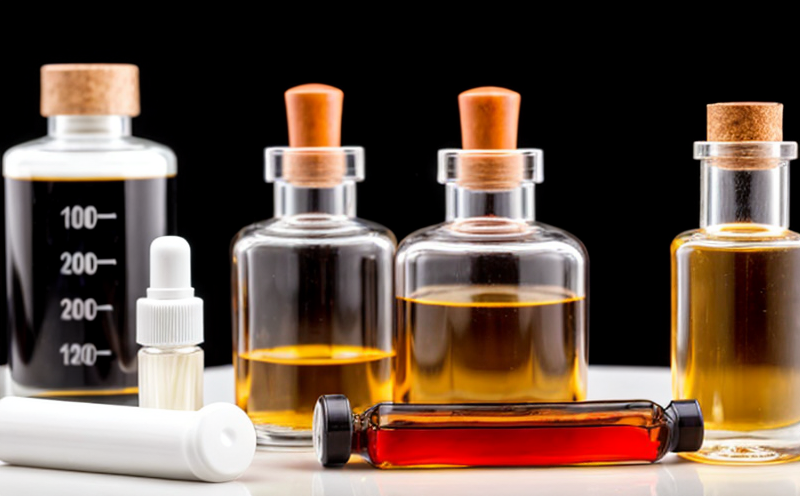Cream Chemical Safety Testing
In today's fast-paced market, ensuring that cosmetic products like creams are safe for consumer use is paramount. Cream chemical safety testing encompasses a range of analytical techniques and methodologies aimed at identifying potential hazards associated with the ingredients in these formulations. This service involves rigorous examination to determine whether the product meets regulatory standards and ensures it does not pose health risks.
Our laboratory specializes in comprehensive analysis, focusing on key components such as preservatives, emulsifiers, antioxidants, surfactants, and fragrances that are commonly found in creams. The testing process begins with meticulous ingredient identification through advanced spectroscopic methods including infrared (IR) and nuclear magnetic resonance (NMR) spectrometry.
Once the ingredients have been identified, the next step is to assess their compatibility and stability within the cream formulation. This involves simulating real-world conditions under which the product will be used or stored. We use high-performance liquid chromatography (HPLC), gas chromatography-mass spectrometry (GC-MS), and differential scanning calorimetry (DSC) among other techniques to evaluate these properties.
Another critical aspect of our service is the examination of toxicological profiles for active ingredients. This includes assessing the potential for skin irritation, sensitization, or other adverse reactions using in vitro and in vivo models as per ISO 10993-2 and ASTM E562 standards. Additionally, we conduct microbiological testing to ensure that microorganisms do not thrive within the product.
The safety evaluation does not end there; it also includes examining the overall formulation for any trace impurities or contaminants introduced during manufacturing processes. These could be due to improper handling practices or equipment contamination. Our team employs ultra-trace analysis techniques like atomic absorption spectroscopy (AAS) and inductively coupled plasma mass spectrometry (ICP-MS).
Our lab follows strict protocols outlined by regulatory bodies such as FDA, EU Cosmetics Directive, and WHO guidelines to ensure compliance with international standards. By doing so, we provide clients with reliable data that can be used to make informed decisions regarding product development and marketing strategies.
In summary, our cream chemical safety testing service offers a holistic approach towards ensuring the quality and safety of cosmetic products. Through cutting-edge technology and adherence to stringent regulations, we aim to deliver accurate results that help maintain public trust in skincare brands.
Applied Standards
The testing procedures for cream chemical safety are guided by several international standards designed to protect consumers from harmful substances while allowing innovation within the industry. For instance, ISO 10993-2 specifies biological evaluation methods used in assessing the potential toxicity of materials intended for contact with biological tissues and fluids.
ASTM E562 provides guidance on determining the limit of detection (LOD) and quantitation (LOQ) for trace elements present in cosmetic products. This ensures that even minute amounts of potentially harmful substances are detected, thereby safeguarding consumer health.
The EU Cosmetics Directive requires manufacturers to demonstrate compliance with specific criteria regarding ingredient safety before placing their products on the market. Our laboratory adheres strictly to these directives ensuring that all tests conducted meet both national and European requirements.
For microbiological testing, we follow ISO 17632 which sets out procedures for sampling and analyzing microorganisms in cosmetic products. This helps us maintain a sterile environment throughout production processes and distribution channels.
In conclusion, our commitment to applying these stringent standards reflects our dedication to delivering accurate and reliable test results that uphold the highest levels of product safety.
Industry Applications
The application of cream chemical safety testing extends beyond mere compliance; it plays a crucial role in enhancing brand reputation and consumer confidence. By rigorously evaluating every aspect of the formulation, companies can identify areas for improvement early on, avoiding costly recalls later.
For quality managers responsible for overseeing production processes, our service provides valuable insights into ingredient selection and process optimization. They gain access to detailed reports that highlight any deviations from expected values or unforeseen challenges during manufacturing stages.
Compliance officers benefit greatly from this testing as it helps them stay updated on changing regulations across different jurisdictions. Keeping abreast of these changes ensures that products remain compliant with local laws, reducing the risk of legal action and reputational damage.
R&D engineers can leverage our findings to explore new formulations or modify existing ones based on empirical evidence rather than speculation alone. This leads to more effective product development cycles resulting in innovative yet safe products reaching market faster.
Lastly, procurement professionals use these test results when sourcing raw materials for their companies. Knowing which suppliers deliver consistently high-quality ingredients allows them to build strong relationships with reliable partners and avoid disruptions caused by substandard supplies.
In essence, our cream chemical safety testing service supports various stakeholders in the cosmetic industry by providing robust data that drives better decision-making across all levels of operation.
Quality and Reliability Assurance
The process of quality assurance (QA) in our laboratory revolves around ensuring consistent accuracy, precision, and reliability in every test performed. To achieve this, we employ experienced chemists who possess extensive knowledge about the latest analytical techniques used in pharmaceutical chemical analysis.
Our QA team conducts regular internal audits to verify that all procedures comply with established protocols. External accreditation bodies like ISO/IEC 17025:2017 ensure continuous improvement and adherence to best practices within our facility.
In addition, we invest heavily in state-of-the-art equipment such as triple quadrupole mass spectrometers (QQQ), quadrupole time-of-flight mass spectrometers (QTOF), and ultra-high performance liquid chromatography coupled with tandem mass spectrometry (UHPLC-MS/MS). These instruments allow us to detect extremely low concentrations of compounds, making them ideal for identifying minute traces of contaminants.
Moreover, our scientists stay abreast of advancements in analytical chemistry through ongoing training and participation in workshops organized by professional societies. This keeps our methodologies up-to-date with the latest scientific knowledge.
By maintaining such high standards throughout each step of the testing process—from sample preparation to final report generation—we guarantee that all results are trustworthy and can be relied upon for critical decisions affecting product safety and efficacy.





